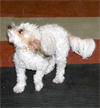Signs of Anxiety
These signs indicate that your dog is uncomfortable with the current situation and there is a need for intervention to prevent pushing the dog to the point of biting, and to make sure your canine friend is happy and not feeling anxious.
Please remember: It is a GOOD THING that a dog shows you that he is anxious or uncomfortable, rather than going straight to a bite. Never punish a dog for showing that he wants to be left alone by growling, leaving the situation or demonstrating more subtle signs. If you punish a dog for growling or breaking a stay to get way from a child you might suppress the warning or avoidance behavior and he might just bite without warning first the next time. The dog still feels exactly the same way about the child bothering him, but now he has no way to show it and no way out of the situation. Be glad if your dog gives a warning and take steps to modify the behavior of the child, condition the dog to enjoy the child and create safe spaces for both dog and child.

One Paw RaisedThis is very cute but the dog is not happy and does
not want to be petted or bothered. She is worried.

Half Moon Eye The dog just wants to be left alone. Watch for this one when kids are mauling the dog. This is a common expression in dogs that being hugged. If you see the half moon eye when the kids approach the dog or are interacting with the dog, it’s time to intervene and give them all something else to do.
Displacement Behaviors
Displacement behaviors are normal behaviors displayed out of context. They indicate conflict and anxiety. The dog wants to do something, but he is suppressing the urge to do it. He displaces the suppressed behavior with something else such as a lick or a yawn. For example, you are getting ready to go out and the dog hopes to go too. He is not sure what will happen next. He wants to jump on you or run out the door, but instead he yawns. The uncertainty of the situation causes conflict for the dog and the displacement behaviors are a manifestation of that conflict. The dog may want to bite a child who takes his bone, but instead he bites furiously at his own foot.
Some examples of displacement behaviors include:
- yawning when not tired
- licking chops without the presence of food – watch the video below to see why this is important
- sudden scratching when not itchy
- sudden biting at paws or other body part
- sudden sniffing the ground or other object
- wet dog shake when not wet or dirty
These are all things that dogs do anyway. It is important to look at the context to determine whether the dog is feeling anxious. For example: if it is bedtime and the dog gets up, stretches, yawns and goes to her bed, then that yawn was not a displacement behavior. If the kids are hugging the dog or lying on him and he yawns or starts licking at them over and over then this is displacement. He wants to get up and leave or even to bite, but he displaces that with yawning or licking them or himself. In this context the licking or yawning behavior tells you that the dog is uncomfortable with whatever the kids are doing and it is time for you to intervene. You must then either prevent the kids from doing this in the future or use positive training techniques to teach the dog to enjoy (not just tolerate) these actions from the kids.
Sometimes dogs are more overt when they feel anxious and want to remove themselves from a situation. Please don’t force a dog to stay in a situation in which he feels anxious, especially if children are the source of his anxiety. Here are some examples:
- the dog gets up and leaves an uncomfortable situation (he may bite rather than leaving one of these days)
- turning head away
- hiding behind person or object
- barking and retreating
- the dog rolls over on back in submissive way (please don’t hurt me!)
Other Body Language Signs of Anxiety
- tail between legs
- tail low and only the end is wagging
- tail between legs and wagging
- tail down or straight for curly-tailed dog (husky, malamute, pug, chow chow, spitz-type dogs etc.)
- ears sideways for erect eared dog
- ears back and very rapid panting
- dog goes into another room away from you and urinates or defecates (Please find a professional behavior consultant for help with this)
All dogs should have a safe place, such as a crate or mat that they can go to when they want to be left alone. All family members and guests should be taught not to bother the dog when he is in his safe place.
Lesson: keep your face out of the face of a strange dog – emphasize this with your kids!


